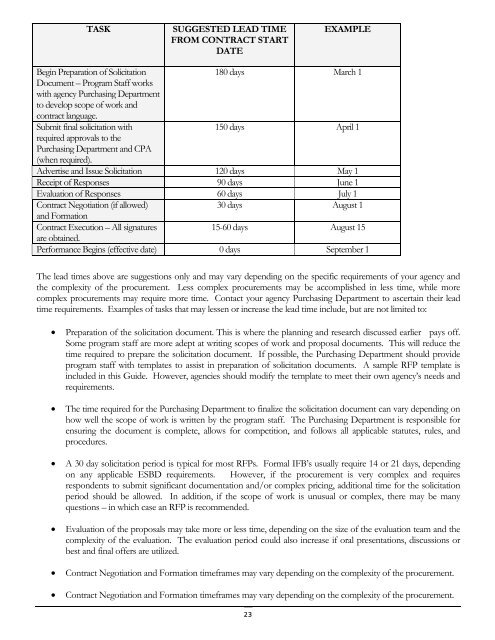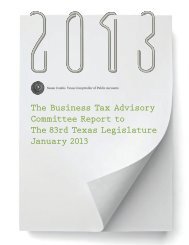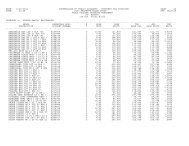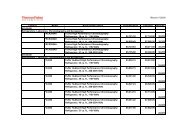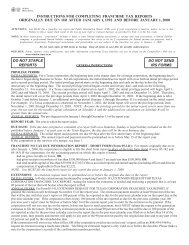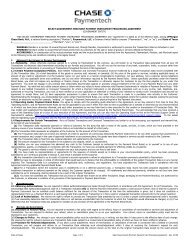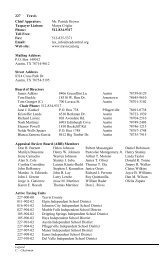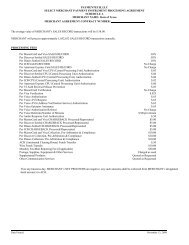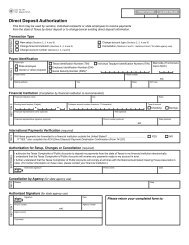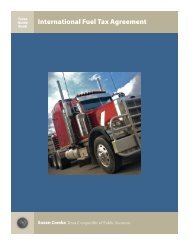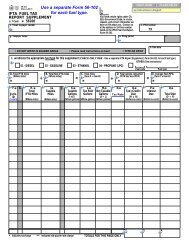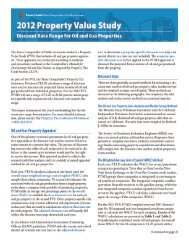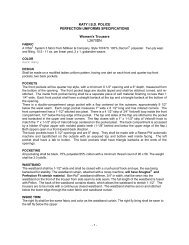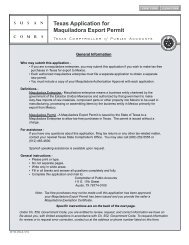Contracts Management Guide - Texas Comptroller of Public Accounts
Contracts Management Guide - Texas Comptroller of Public Accounts
Contracts Management Guide - Texas Comptroller of Public Accounts
Create successful ePaper yourself
Turn your PDF publications into a flip-book with our unique Google optimized e-Paper software.
TASK SUGGESTED LEAD TIME<br />
FROM CONTRACT START<br />
DATE<br />
Begin Preparation <strong>of</strong> Solicitation<br />
Document – Program Staff works<br />
with agency Purchasing Department<br />
to develop scope <strong>of</strong> work and<br />
contract language.<br />
Submit final solicitation with<br />
required approvals to the<br />
Purchasing Department and CPA<br />
(when required).<br />
The lead times above are suggestions only and may vary depending on the specific requirements <strong>of</strong> your agency and<br />
the complexity <strong>of</strong> the procurement. Less complex procurements may be accomplished in less time, while more<br />
complex procurements may require more time. Contact your agency Purchasing Department to ascertain their lead<br />
time requirements. Examples <strong>of</strong> tasks that may lessen or increase the lead time include, but are not limited to:<br />
• Preparation <strong>of</strong> the solicitation document. This is where the planning and research discussed earlier pays <strong>of</strong>f.<br />
Some program staff are more adept at writing scopes <strong>of</strong> work and proposal documents. This will reduce the<br />
time required to prepare the solicitation document. If possible, the Purchasing Department should provide<br />
program staff with templates to assist in preparation <strong>of</strong> solicitation documents. A sample RFP template is<br />
included in this <strong>Guide</strong>. However, agencies should modify the template to meet their own agency’s needs and<br />
requirements.<br />
• The time required for the Purchasing Department to finalize the solicitation document can vary depending on<br />
how well the scope <strong>of</strong> work is written by the program staff. The Purchasing Department is responsible for<br />
ensuring the document is complete, allows for competition, and follows all applicable statutes, rules, and<br />
procedures.<br />
• A 30 day solicitation period is typical for most RFPs. Formal IFB’s usually require 14 or 21 days, depending<br />
on any applicable ESBD requirements. However, if the procurement is very complex and requires<br />
respondents to submit significant documentation and/or complex pricing, additional time for the solicitation<br />
period should be allowed. In addition, if the scope <strong>of</strong> work is unusual or complex, there may be many<br />
questions – in which case an RFP is recommended.<br />
• Evaluation <strong>of</strong> the proposals may take more or less time, depending on the size <strong>of</strong> the evaluation team and the<br />
complexity <strong>of</strong> the evaluation. The evaluation period could also increase if oral presentations, discussions or<br />
best and final <strong>of</strong>fers are utilized.<br />
• Contract Negotiation and Formation timeframes may vary depending on the complexity <strong>of</strong> the procurement.<br />
• Contract Negotiation and Formation timeframes may vary depending on the complexity <strong>of</strong> the procurement.<br />
23<br />
EXAMPLE<br />
180 days March 1<br />
150 days April 1<br />
Advertise and Issue Solicitation 120 days May 1<br />
Receipt <strong>of</strong> Responses 90 days June 1<br />
Evaluation <strong>of</strong> Responses 60 days July 1<br />
Contract Negotiation (if allowed)<br />
and Formation<br />
30 days August 1<br />
Contract Execution – All signatures<br />
are obtained.<br />
15-60 days August 15<br />
Performance Begins (effective date) 0 days September 1


